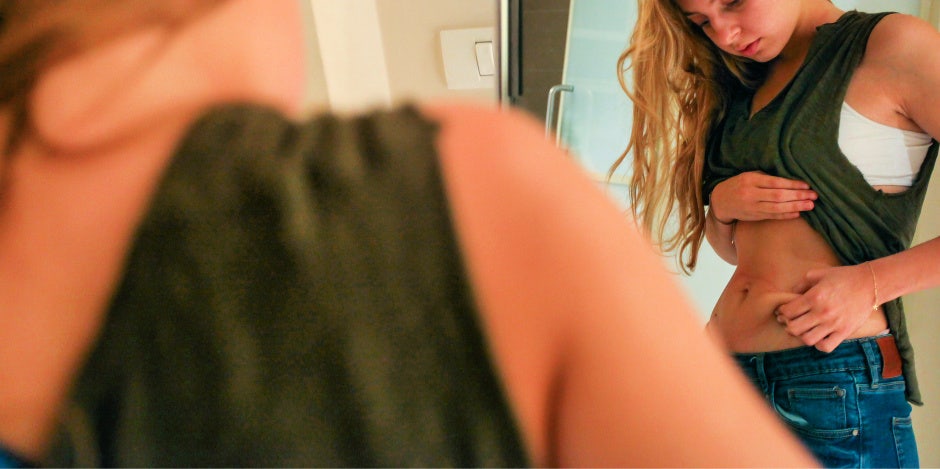What Do You Say When Your Daughter Asks If She Looks Fat?
A simple 'no' won't work, but can she handle the truth?

My daughter is a collection of lines and points.
Her bones are growing so fast that her flesh can barely keep up. Her calves and thighs are smaller than her band-aid-covered knees. Like a puppy, she often becomes tangled in her own feet. I have watched her trip and fall while standing still.
She is almost nine.
My daughter is all energy and confidence. She is one big "yes" that refuses to hear "no."
She struts into a room and assumes her body has a right to be there. She takes up much more space than her small frame requires. She demands praise and then soaks it up like a greedy sponge and then asks for more.
She is voraciously in love with life.
In the mornings before school, my daughter often gets so lost in her own reflection that she forgets to run a brush through her knotty hair.
"What happened up there?" I'll ask after she returns downstairs, her hair no neater than before.
She'll just shrug and head off to school, hair unbrushed, perhaps a smudge of toothpaste still in the corner of her mouth. She doesn't care.
Sometimes I close my eyes and I try to imagine myself at that age.
Did I, too, love myself so wholly and deeply? And if so, when did I stop?
When did I start to pick apart my reflection, quadrant by quadrant, until there was nothing left to please?
Last night, as she was undressing for the bath, my daughter approached me, tentatively.
"Mommy? If I ask you something, will you answer me honestly?"
Then she lowered her eyes, frowning at her tummy, and asked nervously, "Do you think I look fat?"
It troubles her — this small, convex curve on her otherwise bony frame.
I wonder if she will spend her life patting that tummy, willing it to flatten and become concave, even though the women in my family have a long history of blossoming into a stout pear-shape by middle age.
I wonder if, like me, she will never be happy with her appearance, if she will slouch and hunch and turn away from cameras when her friends want to take photos.
I wonder if she has watched me pat my own tummy, frowning.
After I gave birth to my son, I was conscious of the way I poked at my postpartum body, knowing my then three-year-old daughter was eyeing me. I tried not to grimace when she grabbed the folds of fat that sagged around my emptied womb and announced, gleefully, that mommy was "fat."
Her little eyes were mischievous, waiting to see how I reacted to her watching, to her laser focus on my midsection and her use of the "F word."
I wanted to scream, "Don't touch it, don't make it exist!" But her little eyes were always watching, so I forced out a smile.
"Mommy had a baby," I would tell her, "This is what mommies look like after they have babies."
That sounds positive, I think to myself. But at the same time, I resolve to add an extra workout to my week.
What do you say when your nine-year-old daughter asks if she looks fat?
A simple "no" won't work because to answer that way would imply that the question itself is a valid one.
Because my daughter knows she isn't fat.
What my daughter is asking from me, I think, is for a validation of her skinniness.
She wants me to tell her that her body fits into the narrow expectations that society has erected for women's bodies. She wants me to tell her that she's good enough, that she passes the test.
She wants me to tell her that she deserves love even though her tummy is, as she sadly told me last night, "too big" for her body.
I want to tell her that her lovability isn't connected to her size and shape but that the world will, for the rest of her life, tell her the opposite.
Every single image she sees of women — on TV and in the movies, on magazine covers and her toy shelf, in the Fairy Tale High books she reads and in the whispers of the little girls on the playground — chant the same refrain: "be thin, be thin, be thin."
I want to tell her that her battle has just started, that it will come at her from all ends, and that there is no end in sight.
But I can't form those words. I'm not sure she's ready for them yet.
Instead, I look at her looking at her tummy and use the only words I know, the ones that do exist, and which she understands.
It's Sunday night, I still have a lot of laundry to fold, and I'm tired.
So I tell her, with a sigh, "No, you don't look fat."
Then she smiles, and gets in the bath.
Amanda Ann Klein is a professor and mama with bylines in The New Yorker, Salon, Atlantic, The Chronicle of Higher Education, and lots of academic stuff you probably don't care about.
